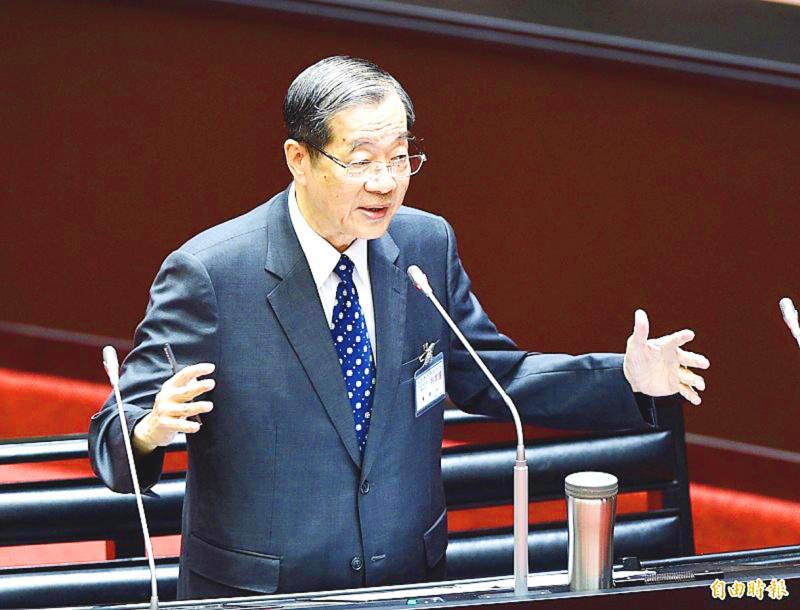Former minister of education Huang Jong-tsun (黃榮村) yesterday told lawmakers that he would support any effort to move the nation toward a sounder constitutional system, including abolishing the Examination Yuan, if he were to be confirmed as its head.
Huang, who was nominated by President Tsai Ing-wen (蔡英文) to be Examination Yuan president, made the remark as the Legislative Yuan in Taipei reviewed his nomination.
Abolishing the Examination Yuan and the Control Yuan has been advocated by many people for a long time, and he would support any effort aimed at boosting the government’s efficacy and improving the nation’s constitutional system, Huang said in his speech.

Photo: Peter Lo, Taipei Times
If the decision was made to abolish the Executive Yuan, he would not seek to cling to his post, but would draft measure to phase it out, while ensuring that its functions of designing civil service entrance tests and evaluating civil servants’ performances be continued, he said.
Traditional paper tests alone cannot meet the needs of society and the government for capable civil servants, so he would take into account the challenges civil servants would encounter on their jobs, their mobility between different fields and whether they have an international perspective, he said.
He would evaluate the need for a two-step entrance test process for civil engineers and other professions concerned with public safety by requiring them to obtain a general license before passing specialized tests administered by professional associations, he said.
The single-track testing system for civil servants, researchers and teachers is no longer “appropriate,” he said, adding that the rules should be amended to separate the testing of the three professions, which would improve the nation’s competitiveness.
During a question-and-answer session with Democratic Progressive Party Legislator Wang Ting-yu (王定宇), Huang was asked whether he would support the inclusion of Taiwanese history as a subject in civil service tests.
Civil servants handling Hakka or Aboriginal affairs are required to take tests on Hakka and Aboriginal history, but those testing for positions in other agencies are not required to be tested on the nation’s history, Wang said.
If civil servants are familiar with the nation’s history, it would significantly benefit their jobs and the nation’s development, he said.
A civil servant concerned with building roads or dams could not do their job well if they did not know the history of a locality, he said.
Huang said that he supports including tests on the nation’s history if the responsibilities associated with a position would benefit from such a move, adding that he would look into the matter.
Taiwanese history could also be included as part of the training program for newly hired civil servants before they are assigned their first jobs, he added.

The manufacture of the remaining 28 M1A2T Abrams tanks Taiwan purchased from the US has recently been completed, and they are expected to be delivered within the next one to two months, a source said yesterday. The Ministry of National Defense is arranging cargo ships to transport the tanks to Taiwan as soon as possible, said the source, who is familiar with the matter. The estimated arrival time ranges from late this month to early next month, the source said. The 28 Abrams tanks make up the third and final batch of a total of 108 tanks, valued at about NT$40.5 billion

Two Taiwanese prosecutors were questioned by Chinese security personnel at their hotel during a trip to China’s Henan Province this month, the Mainland Affairs Council (MAC) said yesterday. The officers had personal information on the prosecutors, including “when they were assigned to their posts, their work locations and job titles,” MAC Deputy Minister and spokesman Liang Wen-chieh (梁文傑) said. On top of asking about their agencies and positions, the officers also questioned the prosecutors about the Cross-Strait Joint Crime-Fighting and Judicial Mutual Assistance Agreement, a pact that serves as the framework for Taiwan-China cooperation on combating crime and providing judicial assistance, Liang

A group from the Taiwanese Designers in Australia association yesterday represented Taiwan at the Midsumma Pride March in Melbourne. The march, held in the St. Kilda suburb, is the city’s largest LGBTQIA+ parade and the flagship event of the annual Midsumma Festival. It attracted more than 45,000 spectators who supported the 400 groups and 10,000 marchers that participated this year, the association said. Taiwanese Designers said they organized a team to march for Taiwan this year, joining politicians, government agencies, professionals and community organizations in showing support for LGBTQIA+ people and diverse communities. As the first country in Asia to legalize same-sex

MOTIVES QUESTIONED The PLA considers Xi’s policies toward Taiwan to be driven by personal considerations rather than military assessment, the Epoch Times reports Chinese President Xi Jinping’s (習近平) latest purge of the Chinese People’s Liberation Army (PLA) leadership might have been prompted by the military’s opposition to plans of invading Taiwan, the Epoch Times said. The Chinese military opposes waging war against Taiwan by a large consensus, putting it at odds with Xi’s vision, the Falun Gong-affiliated daily said in a report on Thursday, citing anonymous sources with insight into the PLA’s inner workings. The opposition is not the opinion of a few generals, but a widely shared view among the PLA cadre, the Epoch Times cited them as saying. “Chinese forces know full well that